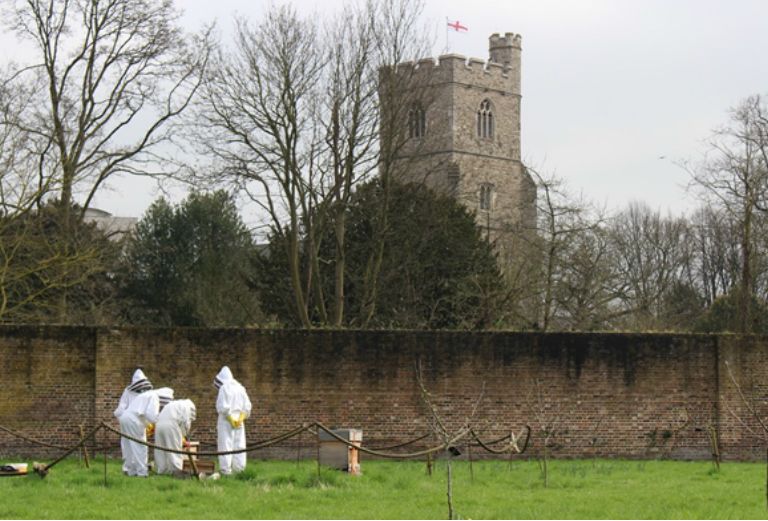
by Sarah Nicholl-Carne, volunteer beekeeper
The Fulham Palace bees have had a good year, producing over one hundred jars of delicious honey which we harvested in August. The first batch has already sold out with a second and final batch due to go on sale at the apple day celebration.
Our honey is raw honey, which means it has never been heated (unlike supermarket honey), which has had most of the beneficial enzymes and goodness boiled out of it.
The severe weather last winter, meant that we lost some of our hives to the‘Beast from the East’, and we now have just two hives, which we are readying for this winter.
Recently, we dosed them with some foul-smelling medication, to get rid of the parasitic Varroa mites, which infest most British bees. I am sure they feel much better now, and they are busy laying down stores to see them through until spring. We give them a helping hand this month, feeding them a thick syrup of sugar and water, which they convert into honey.
The population of the hives is also changing; by the end of August, all the male bees (drones) had been evicted – literally pushed out of the front door – and are now dead. During high summer, there are around 50,000 female worker bees in each hive. That number is falling now, and by the end of October there will be about 10,000 worker bees and the Queen, and they will overwinter together. The workers only go out if the weather is fine; the rest of the time, they cluster in a ball around the queen, keeping warm by fanning their wings, and feeding themselves from the stores.
In a few weeks, we will fit a mouse guard to the entrance of each hive; a metal strip with a series of bee-sized openings, which are too small to admit even a field mouse, who would love to find a warm dry place, with a good supply of honey, to spend the winter months.
The next task will be to make beeswax candles from quantities of spare wax we have accumulated through the year. They will be on sale during November and December. Beeswax candles burn with a much cleaner, and delicious smelling flame than the everyday paraffin candles, and were much prized in the days before electricity.
During the winter months, the beekeeper has very little to do, except keep an eye on the apiary, and keep her fingers crossed that the colonies all make it through to spring.